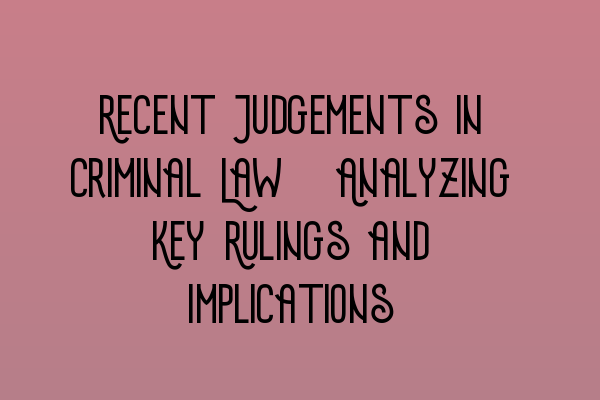Recent Judgements in Criminal Law: Analyzing Key Rulings and Implications
Welcome to the latest blog post by SQE Criminal Law & Practice Law UK. In this article, we will dive into the world of criminal law and explore some recent judgements that have significant implications for both legal professionals and the general public. Understanding these key rulings is crucial for staying up-to-date with the evolving landscape of criminal justice.
1. Case Study 1: R v Smith
One of the most notable recent judgements in criminal law is the case of R v Smith. This ruling sets an important precedent for the admissibility of digital evidence in criminal trials.
The court held that the prosecution could present WhatsApp messages as evidence, despite the defense’s argument that the messages were obtained unlawfully. This judgement emphasizes the courts’ recognition of the importance of digital evidence in modern criminal investigations.
If you are interested in exploring this topic further, we recommend checking out our article on SQE 1 Practice Exam Questions, which covers the various types of evidence admissible in criminal trials.
2. Case Study 2: R v Jones
In another recent ruling, the case of R v Jones addresses the issue of self-defense in criminal law. This judgement clarifies the conditions under which an individual can claim self-defense in a criminal trial.
The court established that self-defense is justified only when the defendant reasonably believed that they were facing an imminent threat of harm. The ruling emphasizes the importance of assessing the reasonableness of a defendant’s actions in cases involving self-defense.
For a comprehensive overview of self-defense laws in the UK, we recommend exploring our article on SQE 1 Practice Mocks FLK1 FLK2. This resource provides valuable insights into the legal principles and factors considered in self-defense cases.
3. Case Study 3: R v Brown
The case of R v Brown focuses on the issue of consent in criminal activities. This judgement provides clarity on the boundaries of consent concerning acts that may otherwise be deemed criminal.
The court ruled that consent cannot be used as a defense in cases involving serious bodily harm or injury. This ruling aims to protect individuals from harm and prevent the potential exploitation of vulnerable individuals.
For a deeper understanding of consent laws and their implications, our article on SQE 2 Preparation Courses is a valuable resource. It covers the legal framework surrounding consent and explores relevant case law on this topic.
Conclusion
These recent judgements in criminal law demonstrate the dynamic nature of the legal system and its ability to adapt to the changing realities of society. It is essential for legal professionals and law students to stay updated with these key rulings to ensure they provide the best legal representation and advice.
If you want to explore more articles on criminal law or stay informed about upcoming SRA SQE exam dates, visit our website at SRA SQE Exam Dates. We offer a wide range of resources and preparation courses to help you succeed in your legal career.
